|
|
This is the story of Germany's mighty battleship: | 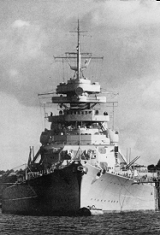 |

 Ursula's
History Web
Ursula's
History WebThe seas were stormy, the gray clouds hung low over the North Atlantic. For six days, thousands of brave seamen were involved in a game of life and death, without a ray of sunshine. It was as if the unfolding tragedies were wrapped in nature's shroud. All participants who had to carry out their duty at sea did so in howling winds and bitter cold, many without sleep and little food. At the time this happened, England stood alone but steadfast against the hated enemy. Headlines in Germany screamed of conquest after conquest: "Greece fallen." "Crete attacked." "Yugoslavia subdued." "British retreat in North Africa." "Rommel advances." "German submarines report great successes in North Atlantic." "Scharnhorst and Gneisenau at Brest ready to join hunt at sea." 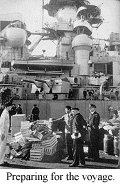 In Kiel, the German battleship
Bismarck was being prepared to meet the enemy. The large walk-in
freezers were bulging with provisions. Masses of meats, vegetables and
flour were loaded on board. Oil tanks were filled to the brim, but most
important was the loading of munitions. A busy little steam locomotive
pulled a chain of wagons, containing the mighty 38-cm shells, of which
each weighed three quarter of a ton. In Kiel, the German battleship
Bismarck was being prepared to meet the enemy. The large walk-in
freezers were bulging with provisions. Masses of meats, vegetables and
flour were loaded on board. Oil tanks were filled to the brim, but most
important was the loading of munitions. A busy little steam locomotive
pulled a chain of wagons, containing the mighty 38-cm shells, of which
each weighed three quarter of a ton.  While
all this was under way, a company of very young sea cadets, having
barely left boyhood behind, arrived to strengthen the number of the
crew. A military band played while the cadets, one by one, proudly
marched aboard. Then someone hollered " Last shell." An officer on deck
repeated the call. Admiral Luetjens, who was already on board went to
the microphone: "Gentlemen" he began, and the young men listened in
sheer fascination. He welcomed the cadets on board and told them they
had been chosen for the coming voyage that they could report their
great deeds after their return. He went on to say that they were now on
the greatest battleship the world had ever seen, and this alone should
be considered a great honor. While
all this was under way, a company of very young sea cadets, having
barely left boyhood behind, arrived to strengthen the number of the
crew. A military band played while the cadets, one by one, proudly
marched aboard. Then someone hollered " Last shell." An officer on deck
repeated the call. Admiral Luetjens, who was already on board went to
the microphone: "Gentlemen" he began, and the young men listened in
sheer fascination. He welcomed the cadets on board and told them they
had been chosen for the coming voyage that they could report their
great deeds after their return. He went on to say that they were now on
the greatest battleship the world had ever seen, and this alone should
be considered a great honor.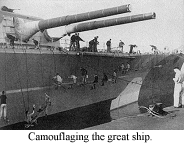 After four months of training
the main crew in the Baltic, the Bismarck was under way. The Admiralty
in London received a radio message from a coastal spy in Norway that
the Bismarck was accompanied by the heavy Cruiser Prinz Eugen and now
the question was: which course will she sail? Will she break through to
the North Atlantic? A British plane spotted the ships and the pilot and
radioed the positions. It was just after midnight of May 22nd, 1941. On
the Bismarck an officer woke the Admiral, who rested in a chair " the
weather report, Herr Admiral." The captain was called. " " " For the
next two days the visibility is almost zero, this means we have to go
now. In ten minutes I want to be on the way." Below deck half the crew
had made an attempt to get some sleep, when the loudspeakers started to
scream " All men on battle stations." The sailors scrambled to their
assigned posts on the dark. A signal went to the Prinz Eugen, which
sent the message: "Understood." The mighty screws began to turn, steam
was rising from the turbines and slowly the ships steered the northern
course. After four months of training
the main crew in the Baltic, the Bismarck was under way. The Admiralty
in London received a radio message from a coastal spy in Norway that
the Bismarck was accompanied by the heavy Cruiser Prinz Eugen and now
the question was: which course will she sail? Will she break through to
the North Atlantic? A British plane spotted the ships and the pilot and
radioed the positions. It was just after midnight of May 22nd, 1941. On
the Bismarck an officer woke the Admiral, who rested in a chair " the
weather report, Herr Admiral." The captain was called. " " " For the
next two days the visibility is almost zero, this means we have to go
now. In ten minutes I want to be on the way." Below deck half the crew
had made an attempt to get some sleep, when the loudspeakers started to
scream " All men on battle stations." The sailors scrambled to their
assigned posts on the dark. A signal went to the Prinz Eugen, which
sent the message: "Understood." The mighty screws began to turn, steam
was rising from the turbines and slowly the ships steered the northern
course.At the precise same moment the British battleship Hood and the Prince of Wales left Scapa Flow. They had chosen the southern course to waylay the Bismarck before she reached the strait of Denmark, just in case she would steer this course. As soon as the Hood had left the protection of Scapa Flow, the raging storm hit them full force. On the Bismarck it was much the same. She worked her way through mountain-high gray waves, far from land, where at any moment she could encounter the enemy. A somewhat hostile exchange took place between the Admiral and the Captain Lindemann. The Captain wanted to rest the crew, but the Admiral gave the order " half the men remain on battle stations, the other half can sleep." While they were talking a message arrived from Berlin, that the Bismarck had been spotted by British planes. All ships of the Royal Navy knew by now the Bismarck was on the prowl. In London the officers of the Admiralty received an urgent message that the Suffolk had spotted the Bismarck in the Denmark Strait and tried to keep contact. "It is decided then" one officer said, pointing at the map "the Hood and the Bismarck will engage somewhere HERE." One of the more experienced officers was very serious. "What is wrong? You are so serious, the Hood is an experienced old lady, twenty years older than the Bismarck, and besides the Prince of Wales is with her, right?" Radio messages went out to the King George V, the Rodney and the Ramillies. The British Admiral, leaning over the large card table, showing the position of each ship, marked the letter X south of the Strait of Denmark. "Tomorrow at daybreak the Bismarck will he HERE." Some time later the admiralty received a message from the Hood that they had sighted the Bismarck and would commence to attack. 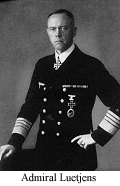 On the Bismarck, the Admiral
was informed that British cruisers throughout the night had sent radio
signals every fifteen minutes. "No doubt, Herr Admiral, they all
concerned our position." Admiral Luetjens said that he had expected
this. He then ordered radio silence, and he told them that they would
now leave the strait of Denmark for the open Atlantic. The board
telephone rang and an officer jumped to answer it. It was from the
bridge "Smoke ahead." More calls came from the bridge about two ships
closing in fast. Captain Lindemann observed the ships through his
binoculars, "They appear to be two heavy cruisers". The Admiral ordered
to give the alarm, the eerie sound of the bells brought every man to
his battle station. A signal went to the Prinz Eugen to open fire as
soon as the proper distance was reached. Captain Lindemann, looking
through his binoculars suddenly said "These are no cruisers. It's the
Hood, it's the Hood! The second looks like a battleship also!", his
words drowned out by the thunder of the first salvo of the Bismarck's
mighty guns. The Admiral excitedly shouted "We need a hit, a hit." The
firing continued and the Admiral watched. Then he said: "Look, she is
hit." They saw large black smoke shooting into the air from the Hood.
Several clouds of black smoke flew upwards as Captain Lindemann watched
in disbelief as the ship broke apart, with the middle part disappearing
into the sea. When the smoke lifted, nothing more was seen of the Hood,
absolutely nothing. On the Bismarck, the Admiral
was informed that British cruisers throughout the night had sent radio
signals every fifteen minutes. "No doubt, Herr Admiral, they all
concerned our position." Admiral Luetjens said that he had expected
this. He then ordered radio silence, and he told them that they would
now leave the strait of Denmark for the open Atlantic. The board
telephone rang and an officer jumped to answer it. It was from the
bridge "Smoke ahead." More calls came from the bridge about two ships
closing in fast. Captain Lindemann observed the ships through his
binoculars, "They appear to be two heavy cruisers". The Admiral ordered
to give the alarm, the eerie sound of the bells brought every man to
his battle station. A signal went to the Prinz Eugen to open fire as
soon as the proper distance was reached. Captain Lindemann, looking
through his binoculars suddenly said "These are no cruisers. It's the
Hood, it's the Hood! The second looks like a battleship also!", his
words drowned out by the thunder of the first salvo of the Bismarck's
mighty guns. The Admiral excitedly shouted "We need a hit, a hit." The
firing continued and the Admiral watched. Then he said: "Look, she is
hit." They saw large black smoke shooting into the air from the Hood.
Several clouds of black smoke flew upwards as Captain Lindemann watched
in disbelief as the ship broke apart, with the middle part disappearing
into the sea. When the smoke lifted, nothing more was seen of the Hood,
absolutely nothing.A message reached the Admiralty from the Suffolk "The Hood is blown to pieces." The men in the war room at the Admiralty were numb with shock. They listened to the next message "Prince of Wales exchanging fire with Bismarck." Then came word from the Suffolk that the Prince of Wales is heavily damaged, on fire and putting up a smoke screen. They intercepted a message from the Bismarck to Berlin. "My God, the whole world is going to know it from them. Quick, get the message out about the Hood. It's better if it comes from us." A short time later the BBC interrupted its regular program with the sad announcement. In the bomb-damaged city of Portsmouth, an elderly lady walked with her shopping bag, when she saw a newspaper vendor scribble the words "Hood sank" on a blackboard. The woman stood still, tear streaming down her face. A passing policeman asked her if she was not well. She pulled herself together and through a veil of tears she answered "Thank you, I am fine." When she reached her humble abode, she took a picture frame, which showed a young man in Navy uniform, into her hands, shaking in spasm she spoke to the image in the picture "and I said I am fine, my son, my son…." On the Bismarck the Admiral and the Captain studied the map. "We should turn back, Herr Admiral." "Turn back? What do you mean, turn back? Goebbels would tear us to shreds with his propaganda. Remember, wars are won with deeds not words." The Captain tried again "But the British, Herr Admiral…" Luetjens then told the Captain that it is most doubtful that the British would lift one little finger in the next days or weeks. The first officer reported damage in one of the oil tanks. "We are leaking oil and leaving a trail behind." The Captain suggested once more returning to Brest. This time the Admiral was really agitated, and he told the Captain that such an action was beyond discussion. The Suffolk radioed the admiralty that the Bismarck was proceeding at reduced speed, which told them that she too was damaged. A call went out to sink the Bismarck at all costs. "We have the Rodney, cable Halifax for the Revenge and call the London and the Edinburgh away from convoy escort duty. And we have the Ramillies, what about the Somerville?" Churchill got in on it and he told the men at the Admiralty, that the destruction of the Bismarck was of the utmost importance. An urgent message came from the Suffolk "Under fire from Bismarck." Then the German battleship disappeared behind a smoke screen. A signal went to the Prinz Eugen to depart. They flagged back. "Thank you and farewell. Best…." The rest they could not see in the thick smoke screen. From headquarters of the German Navy came the message "Fighting group H left Gibraltar at midnight: Aircraft carrier Ark Royal, the Renown, the Sheffield and five destroyers. Course: Atlantic." Looking at the maps it was decided to set course in the northerly direction. The ships of the Royal navy, who had joined in to hunt down the Bismarck, had to fight the stormy seas. The Bismarck had the same problem. The terrible weather and the continuous state of alert had deprived them of much needed sleep, and the young cadets looked worn and tired. The Admiral informed the Captain that he wished to address the crew. "Men of the Bismarck," he began, "I can not call you away from your stations, as you know, the enemy is looking for us. Only a few of you can join me in the celebration, the rest of you can at least hear my words. The Fuehrer has personally asked me to congratulate your Captain and the entire crew on your success. Sieg Heil!" The response of the men did not sound very convincing, all were tired and many were afraid of what may lie ahead. Then the Admiral awarded several medals. Just as he was saying what an honor it was for him to award the Ritterkreuz with swords and diamonds to Captain Lindemann, the sirens wailed. "Alarm, alarm, enemy planes approaching." The anti-aircraft guns were firing before the Admiral and the Captain reached the bridge. They counted nine aircraft, type Swordfish. The Captain realized that the carrier must be near by. One small torpedo had caused some leakage, but no one was injured. The Admiral followed the Captain to the map room, where they argued over the range capability of the planes. Meanwhile, the men in the war room of the Admiralty in London heard from the Victorious that they had observed a hit on the Bismarck, but that she was doing 20 knots. "There you have it, she is not slowing down," the Admiral said. The Suffolk radioed that they had lost the Bismarck in the dark and the dense fog. In New York a commentator said "Ladies and gentlemen, 24 hours have gone by that we reported the sinking of the Hood by the Bismarck. Since then we have not heard one single word from London." The question "Where is the Bismarck?" made headlines around the world. Thousands of newspapers in hundred different languages had this question on the title page. With as much speed as she could muster, the Bismarck slid through the stormy seas in direction of Port St. Nazaire at the French coast. Four days she had been at sea and during this time the crew had not slept for even one whole hour. Many tried to snatch a few minutes rest at battle stations. Beards sprouted even on the youngest faces. Throughout a never-ending gray day the British warships labored in the stormy seas, searching tirelessly for the Bismarck. Planes scanned the Atlantic in dangerously low altitude for any sign of the enemy ship. Several planes had started from Ireland to join in the search, flying in southwesterly direction. Suddenly one of the pilots saw something below him. A few seconds later they knew they had found what they had been searching for. "It's a battleship, it's the Bismarck!" Anti-aircraft shells bursting around his plane, the pilot turned with lightning speed and disappeared into protective cloud cover. Then he radioed the position of the German battleship. The Ark Royal picked up the message. Meanwhile the radio officer on the Bismarck noticed the increased communications between the Ark Royal and other British ships. The Admiral on the Bismarck once again addressed the crew over the microphone, telling them to do their duty. Fifteen planes took of from the Ark Royal, one after the other. The radio officer on duty raced to the bridge."The Sheffield has sighted the Bismarck and our planes are in direction of the Sheffield." An urgent call went out to the planes "Watch for the Sheffield, watch for Sheffield." They had fired a few torpedoes, luckily missing the Sheffield, when they got the call. The whole squadron returned to the Ark Royal. The Commodore told them "This can not happen a second time, but you still have one hour of daylight left." And the planes, one by one, took off again. At the Admiralty in London an urgent message came in: "Swordfish planes attacking Bismarck. Bismarck returning fire." The message from the Sheffield "Attack ended, planes leaving." At the Admiralty they could not make sense of this. Then: "Bismarck steering north." " North? That is where the Rodney stands." And again "Bismarck doing nine knots" The Ark Royal confirmed a hit on the German battleship, which had reduced her speed. Deep inside the Bismarck the men were working frantically to repair the damage by emergency lights. A diver, inspecting the damage, appeared out of the dark water, bleeding from shoulder wounds. The pumps were working overtime and the Captain was informed that the damage could not be repaired at sea. The rudder would not work. 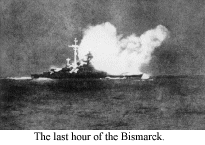 The Rodney had been on her way
to Canada with five hundred wounded soldiers aboard, when she was
diverted to join the search for the Bismarck. She was now closing in,
and the King George V was also gaining on distance. The disabled German
battleship found itself surrounded by ships of the Royal Navy. The
mighty guns fired salvo after salvo. So began the terrible fight, which
no one, who survived, would ever forget. The men on the Bismarck
struggled to keep their eyes open, even in this terrible racket and
noise of the guns. One of the destroyers sent a flare up which eerily
illuminated every part of the Bismarck. The Admiral screamed "Send a
message to Berlin that we will fight until the last shell is gone. Long
live the Fuehrer!" The Captain said "Shortly it will be daylight. Some
of the destroyers are out of the range of our guns. But the Suffolk is
keeping us company." The Rodney had been on her way
to Canada with five hundred wounded soldiers aboard, when she was
diverted to join the search for the Bismarck. She was now closing in,
and the King George V was also gaining on distance. The disabled German
battleship found itself surrounded by ships of the Royal Navy. The
mighty guns fired salvo after salvo. So began the terrible fight, which
no one, who survived, would ever forget. The men on the Bismarck
struggled to keep their eyes open, even in this terrible racket and
noise of the guns. One of the destroyers sent a flare up which eerily
illuminated every part of the Bismarck. The Admiral screamed "Send a
message to Berlin that we will fight until the last shell is gone. Long
live the Fuehrer!" The Captain said "Shortly it will be daylight. Some
of the destroyers are out of the range of our guns. But the Suffolk is
keeping us company." 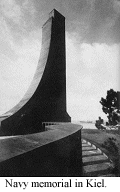 Suddenly
someone shouted "Two ships to our right." Through his binoculars the
Captain recognized the Rodney and the King George V. The Rodney fired
and everything went dark on the Bismarck. While the guns were swinging
around, another salvo from the King George V hit, before the Bismarck
could engage her. The next one hit the bridge and dozens were lying
everywhere, among them Captain Lindemann. When the Dorsetshire arrived,
the Bismarck was a burning, sinking wreck. Two torpedoes from
Dorsetshire exploded on the dying ship. Then the giant hulk rolled
sideways and disappeared into the depth of the North Atlantic.
"BISMARCK SANK" The news went around the world. Again there were many
mothers, wives and children for whom this loss was as terrible as for
the mother in Portsmouth, England. Suddenly
someone shouted "Two ships to our right." Through his binoculars the
Captain recognized the Rodney and the King George V. The Rodney fired
and everything went dark on the Bismarck. While the guns were swinging
around, another salvo from the King George V hit, before the Bismarck
could engage her. The next one hit the bridge and dozens were lying
everywhere, among them Captain Lindemann. When the Dorsetshire arrived,
the Bismarck was a burning, sinking wreck. Two torpedoes from
Dorsetshire exploded on the dying ship. Then the giant hulk rolled
sideways and disappeared into the depth of the North Atlantic.
"BISMARCK SANK" The news went around the world. Again there were many
mothers, wives and children for whom this loss was as terrible as for
the mother in Portsmouth, England. References Die letzte Fahrt der Bismarck. By C. S. Forester, Wolfgang Krueger Verlag GmbH, Hamburg, 1959. |
 for more.
for more.